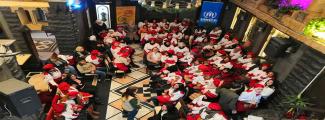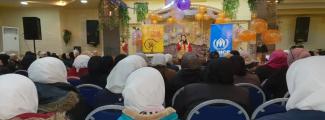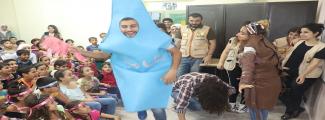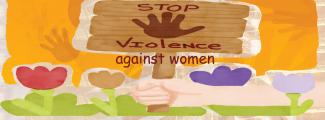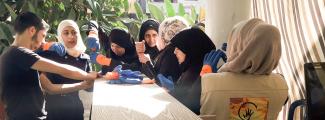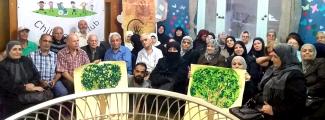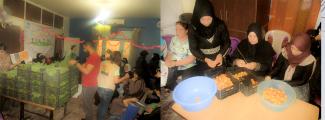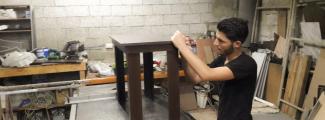The Syrian Society for Social Development, in cooperation with UNHCR, organized courses on the basics of confectionary (both oriental and international) for beginners and advanced, cuisine chef courses, and specialized courses on candy making (chocolate), with 124 beneficiaries. The pioneers of these courses are the community center beneficiaries, some of whom referred by the CCs case managers (CP, GBV and PSS psychologists).
The closing ceremony included the distribution of certificates to the beneficiaries, in addition to the printed training booklet. Some participants shared their experience with the attendees:
Ms. Umm Ali: “I’m one of the women who returned to Ghouta... Through training, we learned to exchange love as much as we learned the craft skills… It was as if we were one family, despite the trainees’ great diversity... Though the restaurant is far away from my house, I was always the first to arrive because I was so eager to learn and I enjoyed the lovely relationship between us, the trainees... And there are many like me!”
Ms. B.Q.: “I’m my household head and have two daughters... The training had a great impact on my family and material situation. I became a professional and an income-generating person, since I worked after the training in sweet-making. I work at home and distribute my products to shop owners in the Jaramana district. My new work helped me meet the household needs and follow up on my girls’ schooling.”
Ms. S.: “I could hardly imagine the course would end! I came to have many friends. We helped each other and kept in contact, even though each is from a different place and environment… I’ve had a successful interview with the restaurant manager and will be working in the restaurant. This was a great boost to my self-confidence.”
It is noteworthy that, according to the evaluation, some of the beneficiaries have been networked with the labor market, with three possibilities: working at home, working at the Zeus Restaurant, and working in confectionary shops in the Jaramana district.
Jaramana - Bayt Al'aman
16 Days of Activism Against Gender-Based Violence December 2018 Rural Damascus
With a view to raising awareness about GBV-related issues, emphasizing the rejection of thisand all forms of violence, introducing the concept and types of GBV, discussing its causes and consequences, proposing solutions to reduce it, and stressing the importance of reporting in case of exposure, the Syrian Society for Social Development organized an event on the occasion of the 16 Days of Activism Against Gender-based Violence under the slogan Safety and Equality atHome, at Work and Everywhere at the SSSD community centres in Rural Damascus (Jaramana, al-Hameh, ‘Adra Industrial Zone) and in the ‘Adra Workers’ Housing neighbourhood.
The event included activities and awareness sessions carried out within the community centres. The aim of the event was to recapitulate and highlight the awareness campaigns carried out throughout 2018 on all GBV-related topics that targeted all age groups. Several outdoor activities were also carried out, including candlelit marches in both Jaramana and al-Hameh and the distribution of leaflets on GBV-related issues.
-
- 1 - Jaramana
-
During the 16-day campaign against GBV, the SSSD team targeted women throughawareness-raising sessionson sexual harassment and abuse, early marriage and intimate partner violence,the importance of education for girls andwomen’s right to work, with a view to women’s empowermentin various aspects of life.
In addition, external activities were carried out that aimed at raising awareness among adolescent boys and girls about the concept of gender discrimination and the importance of gender equality. Such activities included a mixed-gender football match held at the Jaramana Municipal Stadium between the CC adolescentsand a similar mixed-gender basketball game played at the Jaramana Basketball Court. The two games were punctuated by several recreational activities and dances performed by the CC adolescents, awareness activities about women’s rights,with emphasis on women’s right to work and the importance of gender equality in terms of opportunities, services and available/provided resources.
With the participation of the Women’s Committees, children of the Child Protection Club and some school girls, wall paintings were executedon the wall of the Haitham Abdu-s-Salam School, expressing the rights of the child and the right of the girl to education. The first mural featured raised hands representing fundamental rights, each handrepresenting one of these rights (the rights to equality, to education, to health care, to opinion, to play, etc.). The second mural, entitled Teach them…, reflected the importance of education for children regardless of gender. The third muralfeatured the campaign’s mottoSafety and Equality at Home, at Work and Everywhere. The fourth muralrepresenteda group of children carrying their notebooks.The fifth mural was a graffiti with the slogan Education IS Safety.At the end of the activity the children distributed GBV leaflets to passers-by and all participants were thanked for their assistance.
In order to emphasize the importance of reporting GBV in case of exposure, a candlelit vigil was carried out in the vicinity of the Swords Square, Jaramana, with members of the Women’s Committees and children of the CP Club holding placards about gender equality, women’s rights, No to Violence signs and the importance of GBV reporting.
After that, the march began around the Swords Square, led by the Damascus Scouts Band, with the participation of SSSD volunteers and the CP Club, carrying placards with GBV-related slogans.At the end of the march, the Scouts performed their music in the courtyard and Women’s Committee members and female passers-by raised placardsagainst gender discrimination. Anti-GBV leaflets were distributed and a panto sketch featured a battered woman who resorted tolaw to solve her problem. “Violence against women is inadmissible,” said a man from the audience.“With determination and perseverance women can overcome violence against them,” said a woman.
After that, a drama sketch about early marriage was presented, highlighting the problems facing girls married off at an early age. The performance was an occasion to discuss the causes and consequences of GBV. “This marriage is unlawful and must be invalidated,” commented a man.
Weconcluded the activity with a final march around the Squarewith the participation of the Scouts, the CP Club and Women’s Committee members.
In order to emphasize the complementary roles of men and women, the right of women to choose the work they want and their ability to exercise all professions, one of the streets of the Karm Smadi neighbourhood was specially prepared and the CC female volunteers dressed in the outfit of occupationsusually reserved for men (wall painter,gas seller,mechanic,blacksmith, etc.). Every volunteer carried a slogan (“I can,”“We’re equal, aren’t we?”“What prevents?”) in order to emphasize gender equality. One of the women said, “There’s nothing shameful in work. It’s one of women’s rights. What you’re doing is really wonderful!” Another woman shared a personal experience. “I was truly thrilled by what I saw because I had experienced a phase in my life when I had to connect a gas cylinder, repair faucets, etc., all by myself,” she said. One woman enquired about the reason why women were dressed like that, while other womenwere surprisedthat women could exercisesuch professions. So, it was explained to them that the aim was to express the importance of women’s role in community and their ability to play it effectively.
With the participation of members of the Women’s Committee, we also heldplacards highlighting the obstacles facing women and preventing them from assuming their role in community. “Deprivation of resources and opportunities harms women and,consequently,causes social disintegration.It also leads to total marginalization of women,” said one woman.
In the meantime, one of the SSSD volunteers,dressed infolk clothes,poured Arabic coffee for passers-by. Leaflets were also distributed. At the end of the activity, CP Clubmembers presented a dabké dance.
Finally, we asked for some supportive messages, such as: “Say what’s on your mind,” “Don’t let the 16-Day event pass like that,” “Be strong,” etc.).
The event was closed at the Waqf Hall, Jaramana, with the CC children and teens performing a group dance and thanking the beneficiaries for their attendance and participation.
- 2 - Al-Hameh
-
During the 16-day campaign against GBV, the SSSD team targeted women throughawareness-raising sessionson sexual harassment and abuse, early marriage and intimate partner violence,the importance of education for girls andwomen’s right to work, with a view to women’s empowermentin various aspects of life.
In addition, external activities were carried out that aimed at raising awareness among adolescent boys and girls about the concept of gender discrimination and the importance of gender equality. Such activities included a mixed-gender football match held at the Jaramana Municipal Stadium between the CC adolescentsand a similar mixed-gender basketball game played at the Jaramana Basketball Court. The two games were punctuated by several recreational activities and dances performed by the CC adolescents, awareness activities about women’s rights,with emphasis on women’s right to work and the importance of gender equality in terms of opportunities, services and available/provided resources.
With the participation of the Women’s Committees, children of the Child Protection Club and some school girls, wall paintings were executedon the wall of the Haitham Abdu-s-Salam School, expressing the rights of the child and the right of the girl to education. The first mural featured raised hands representing fundamental rights, each handrepresenting one of these rights (the rights to equality, to education, to health care, to opinion, to play, etc.). The second mural, entitled Teach them…, reflected the importance of education for children regardless of gender. The third muralfeatured the campaign’s mottoSafety and Equality at Home, at Work and Everywhere. The fourth muralrepresenteda group of children carrying their notebooks.The fifth mural was a graffiti with the slogan Education IS Safety.At the end of the activity the children distributed GBV leaflets to passers-by and all participants were thanked for their assistance.
In order to emphasize the importance of reporting GBV in case of exposure, a candlelit vigil was carried out in the vicinity of the Swords Square, Jaramana, with members of the Women’s Committees and children of the CP Club holding placards about gender equality, women’s rights, No to Violence signs and the importance of GBV reporting.
After that, the march began around the Swords Square, led by the Damascus Scouts Band, with the participation of SSSD volunteers and the CP Club, carrying placards with GBV-related slogans.At the end of the march, the Scouts performed their music in the courtyard and Women’s Committee members and female passers-by raised placardsagainst gender discrimination. Anti-GBV leaflets were distributed and a panto sketch featured a battered woman who resorted tolaw to solve her problem. “Violence against women is inadmissible,” said a man from the audience.“With determination and perseverance women can overcome violence against them,” said a woman.
After that, a drama sketch about early marriage was presented, highlighting the problems facing girls married off at an early age. The performance was an occasion to discuss the causes and consequences of GBV. “This marriage is unlawful and must be invalidated,” commented a man.
Weconcluded the activity with a final march around the Squarewith the participation of the Scouts, the CP Club and Women’s Committee members.
In order to emphasize the complementary roles of men and women, the right of women to choose the work they want and their ability to exercise all professions, one of the streets of the Karm Smadi neighbourhood was specially prepared and the CC female volunteers dressed in the outfit of occupationsusually reserved for men (wall painter,gas seller,mechanic,blacksmith, etc.). Every volunteer carried a slogan (“I can,”“We’re equal, aren’t we?”“What prevents?”) in order to emphasize gender equality. One of the women said, “There’s nothing shameful in work. It’s one of women’s rights. What you’re doing is really wonderful!” Another woman shared a personal experience. “I was truly thrilled by what I saw because I had experienced a phase in my life when I had to connect a gas cylinder, repair faucets, etc., all by myself,” she said. One woman enquired about the reason why women were dressed like that, while other womenwere surprisedthat women could exercisesuch professions. So, it was explained to them that the aim was to express the importance of women’s role in community and their ability to play it effectively.
With the participation of members of the Women’s Committee, we also heldplacards highlighting the obstacles facing women and preventing them from assuming their role in community. “Deprivation of resources and opportunities harms women and,consequently,causes social disintegration.It also leads to total marginalization of women,” said one woman.
In the meantime, one of the SSSD volunteers,dressed infolk clothes,poured Arabic coffee for passers-by. Leaflets were also distributed. At the end of the activity, CP Clubmembers presented a dabké dance.
Finally, we asked for some supportive messages, such as: “Say what’s on your mind,” “Don’t let the 16-Day event pass like that,” “Be strong,” etc.).
The event was closed at the Waqf Hall, Jaramana, with the CC children and teens performing a group dance and thanking the beneficiaries for their attendance and participation.
- 3 - Sett Zeinab
-
The 16-day event to combat violence against women coincided with the opening of the Sett Zeinab Community Centre, which was an occasion to introduce the community to GBV-related topics and the 16 Days of Activism Against Gender-based Violence.
The Centrewas prepared to receive various age and community groups. The event lasted from December 1 to December 10 and included awareness sessions on various GBV-related topics, targeting various groups, as well as recreational activities and singing in whichall the CC’s children and adolescents, boys and girls alike, participated.
- 4 - ‘Adra
-
During the 16 Days of Activism Against Gender-based Violence, the SSSD team operating at the‘Adra Industrial Zone and ‘Adra Workers’Housing carried out several awareness and recreational activities.
Based on the fact that women are halfthe society and raise the other half, and sinceknowledge is our safe-conduct to the future and education is indispensable for girls, a library was designed in the form of a girl’s head and assembled at the Farah Community Centre, ‘Adra Industrial Zone. This event was part of the 16-Daysof Activism Against Gender-based Violence, in recognition of women’s right to complete their education and raise awareness against depriving the girls of their lawful right to get educated.The CC’s women arranged the books on the bookshelves and set up a mechanism to borrow books. One of them said, “You truly made my day! Even though I am old, I really want to borrow books, readand broaden my culture!”
At the end of the activity, two video clips were presented, one discussing the importance of education for girls and the other explaining the obstacles to girls’ education. Products of women who followed the vocational training courses at the CC were also exhibited.
Regarding external campaigns, several awareness sessions were held at the ‘Adra el-Balad School on GBV-related topics, in addition to recreational activities targeting children and adolescent boys and girls.
At the AbuRashed Hall, ‘Adra Workers’ Housing, various awareness-raising activities on GBV-related topics were conducted, such asan awareness presentation on reproductive health issues, in view of the absence of a nearby medical point that women can visit. Breast cancer was also focused on, with methods of self-examination presented, as well as and the importance of periodic checking at the doctor’s. Drama sketches, songs and recreational activities were also presented.
Other activities were held at al-Laith Hall, ‘Adra Industrial Zone, with awareness and recreational activities.
One of the girls: “Thanks to the Farah Centre, thanks to their support and encouragement, I returned to my school.To all who participated in such a wonderful humanitarian work I say: THANK YOU!”
The event was concluded with a promo presentation of all campaigns carried out from the beginning of the year. Thus, the women could recapitulateall the major topics discussed with them during the year, most notably the early marriage campaign, the girl’s right to education campaign and the importance of reporting GBV and intimate partner violence. The womenrecalled many of the details discussed during those campaigns and the information they hadlearned.
Prevent Tooth Cavity and Head Lice for Children - CPI
Community- led initiative “Prevent Tooth Cavity and Head Lice for Children”, Athar Al-Farashah and Beit Al-Wiam community centers, Rural Damascus, Jaramana.
Drawing on the belief “We Care about your Health”, especially taking care of children’s health at early ages, and due to the severity of head lice and tooth cavity spread among very young children, SSSD team, in cooperation with UNHCR, organized a community- led initiative (CLI) in Rural Damascus, titled “Prevent Tooth Cavity and Head lice for Children” on 12-10-2018.
The idea of the CLI came to life during a focus group discussion with the children who expressed their toothaches, their fear to visit the dentist, and their parent’s financial strains to treat them. They also mentioned that their friends suffer from head lice and spoke about the negative side effects on their health, everyday life, and daily routine, be it at home or school.
SSSD cooperated with Dr. Aghiad Daheem, who was enthusiastic to volunteer and help IDP kids. 50 children, boys and girls, received full- dental treatment. This kind gesture stressed the importance of community participatory work drawing on the abilities of each individual, offering help and supporting vulnerable groups.
4 barbers who benefited from the livelihood tool-kit program performed haircuts for 100 children, boys and girls. Those barbers believe in social responsibility, especially after receiving the tool kits that enabled them to provide for themselves and support others.
Dental treatment and haircuts were preceded by health awareness campaigns pertaining the importance of keeping the hair clean and treatment steps to end head lice, as well as, shedding light on kids’ tooth problems, how to prevent them through oral health and regular dentist visits. To break kids’ fear of dental treatment, the campaigns included entertainment activities, at which the dentist participated.
The adolescents from the mentoring program and child protection club participated in carrying out the activities of the campaign, including the entertainment activities.
This CLI had huge positive impact on all the participants and left unforgettable imprints, particularly raising awareness about health care to prevent tooth and hair problems. In addition to promoting the spirit of humanitarian assistance and aid.
Seeing Life through a new lens
Wafaa is a 51-year-old woman, married, with two daughters, who used to live in Jobar and work as an elementary teacher. The family suffered from financial hardships, the husband had to sell the house and buy a small house in Jaramana. During the crisis, the house was completely destroyed by a mortar shell. As a result, the family was forced to rent out a small house.
Via word of mouth, Wafaa heard of Al- Wiam Center and the provided services. She visited the center requesting support to solve her differences with her husband.
She was referred to the GBV case manager, who interviewed her. She explained that she was married at 21 without her parent’s blessings. In the beginning her relationship with her husband was good; however, their financial distress and constant movement from one place to another negatively affected them and triggered problems between the couple. The husband started abusing, beating, and humiliating his wife in front of their kids. He even caused permanent back injury to her. Their intimate life almost ceased and he violently had sex with his wife on rare occasions.
This harsh reality was negatively reflected on the lady’s relationship with her kids and the whole family. She suffered from substantial psychological pressures and a huge disappointment, as she was not able to maintain a perfect family.
Wafaa was referred to the psychological section for support. Her workplan covered the following:
-overcome the shock, being verbally and physically abused by her husband.
-Assert the positive aspects of her personality.
-Compare the pros and cons of her relationship with her husband to reach a conclusion regarding their marriage.
-Regulate sleeping time and take regular walks.
-Practice relaxation techniques.
She was also enrolled in the women sessions and GBV campaigns, those interventions had positive impact on the lady and her relationship with her husband and daughters.
Tracking Wafaa’s case, our interventions had big impact on her. We quote her:
“I am able to communicate with my husband and deal with his anger. My relationship with my daughters is better. I used to come to the center with my head filled with negative thoughts. The sessions worked as a magnet that pulled my negative thoughts and charged me with positive thoughts. My spirit was revived and each passing day I came back home showing love to my daughters and husband and offering new gestures. Gradually, I re-communicated with my friends, whom I hardly contacted in the past, due to my psychological situation. I learned about women rights and children rights, and I advise women suffering from GBV to seek help from this center to regain control over their lives.”
Today, Wafaa is an active member in the women’s committee. She plays a critical role and participates in all the campaigns, encouraging women to learn about their rights and claim them.
Wardrobe Making - CBI
“THEY make up one half of society”—On the basis of this fact, and believing in the crucial role of women, and in order to enhance the community’s participation in finding solutions to their problems and meeting their needs, the Syrian Society for Social Development (SSSD) conducted on 03/10/2018 in Rural Damascus, in cooperation with the UNHCR, a community-based initiative (CBI) entitled Wardrobe Making.
The idea of the CBI emerged during a focus group discussion (FGD) session held with women, displaced and heads-of-household, in which they raised the problem of storing clothes in bags after washing them because there were no wardrobes in their homes. In the meantime, clothes had been exposed to wear and mold as a result of rodents and moisture.
20 women participated in the CBI and made 20 wardrobes with the help of beneficiaries of the Vocational Training and Livelihood Toolkits Program. The women’s enthusiasm was remarkable; so was their keen desire to experiment in totally new things. The CBI fostered a spirit of cooperation among women, establishing the skill of dialogue by accepting the different views that were presented regarding work proceedings, not to mention the experience the women gained in woodworking.
Every participant ended possessing a wardrobe for her family, increased her sense of responsibility and confidence in her ability to contribute in supporting her family and, last but not least, felt a great joy when the wardrobe was finished!
Breast diseases awareness sessions
Breast cancer is one of the most common types of cancer among women. With the aim of raising the level of health awareness and disseminating basic medical and preventive knowledge concerning breast cancer among girls and women, the Syrian Society for Social Development (SSSD) team held within the Hear-My-Heart Program, in cooperation with the Syrian Breast Cancer Association and the UNHCR, several awareness sessions entitled Awareness of Breast Diseases and Cancer: Etiology, Symptoms, Early Detection and Treatment Protocols. The sessions were held on 08/22-29/09/2018 in the following districts: Jaramana (Butterfly Effect and Beit al-Wiam CCs), al-Hameh (al-Salam CC).
118 women attended, whose interaction was positive and significant. This was evident through the women’s active participation and questions that enriched the sessions. To encourage the women, the Breast Cancer Association later offered the opportunity to conduct mammography screenings, free of charge, in several centers throughout October for all demanding women.
The Tree of Life
“Life has taught me to be as soft as leaves of a tree, as rough as its trunk, as solid as its roots, as fragrant as its scent, to be like a fertile soil that gives to the one who plants free of charge…”
In this context, on 18 August 2018, in Rural Damascus, Jaramana District, Beit al-Wiam CC, SSSD organized, in cooperation with the UNHCR, a session entitled the Tree of Life. The session, which was held within the Old-But-Gold Program, included 36 beneficiaries of seniors, during which the life process of several people was evoked. They shared what they learned from life experiences and the way they handed those experiences over to their children and grandchildren. In fact, Life is always the Great Teacher. The session was followed by a handicraft activity, during which the elderly made a tree they named the Tree of Life.
The interaction of the beneficiaries was great, which showed in the verbal expression of their many experiences that proved to be as many enriching life lessons. They were also happy with manual work and the fact of enthusiastically sharing with each other.
" we stand together ” CBI—Jaramana, Rural Damascus
In order to enhance the confidence of women in themselves and their ability to help their families and help others, the Syrian Society for Social Development (SSSD) in Rural Damascus, in cooperation with the United Nations High Commissioner for Refugees (UNHCR), organized a community-based initiative under the title "we stand together ”.
The initiative, which was proposed by a group of mothers and elderly people who attend the activities of " Bet Al-Weam" community center within “ our ancient gold “ and “ hear my heart” groups, aims to manufacture clean and Healthy food which can be used for a long period of time (apricot jam - Cheese and sour cream - pickles - grapes leaves) , with the cooperation of the group who proposed the initiative among themselves and and the participation of a group of newly displaced women in the region , and distributing some portions to the families of the new immigrants from the region of Ghouta to the region of Jaramana using the help of SSSD monitoring of the targeted area , which contributed to strengthening bonds of love , spirit of partnership and teamwork among women by sharing their experiences during the implementation .
And a safe bed we made
Rima, a woman from northern rural Aleppo, was forced to flee her hometown because of the poor security conditions. She and her family of 7 children—the eldest of whom is 12 and the youngest 4 months old—currently live in an unfinished house at Daff al-Sakhr, Jaramana district, Rural Damascus.
From the Child Protection case manager who follows up on the family’s file we learned that four-month-old ‘Abd was suffering from a severe allergy resulting from his sleeping on the floor in a cold house full of dust. His mother had to take him repeatedly to the doctor to ease bouts of coughing and wheezing. Not to mention the risk of being bitten by rodents that swarm in unfinished buildings.
Then it occurred to us to tell the beneficiaries in the carpentry course (Vocational Training Program) about the family’s predicament and see whether they could be of help. Soon enough, a small, simple, lovely bed was specially made for ‘Abd!
When we went to Rima’s house to check on the family and deliver the bed, she warmly greeted us and was sincerely thankful. Then, without a second thought, she made the bed and put the baby in it.
‘Abd’s siblings rejoiced, though with a sigh. “Sister, you remind us of the bed we used to have back home,” said one of the baby’s brothers. “Just for ‘Abd?” asked his sister. “But we’re still sleeping on the floor, all the rest of us!”
I explained to them that the bed was now necessary to heal their little brother’s discomfort, that many many families had lost their homes and all their furniture as well.
Indeed, in the current circumstances of the war, where so many families have lost their homes and furniture, vocational training is proving useful in the sense that it can help a large number of internally displaced families meet some of their urgent needs for relative comfort and safety.
Walking Together
Anas, 17, was born in rural Aleppo. He grew up there, living with his parents and brother. His father used to work in agriculture, but as the crisis intensified in 2011, Anas was forced to leave with his mother and brother to Deir al-Zaur. His father did not wish to leave so he remained in his hometown.
Thus, Anas became the family’s sole breadwinner. The young man, who was a hard-working student, had to leave school because of the poor economic situation, so that his brother might continue his education.
Three years after they were first displaced to Deir al-Zaur, the family had to move again to rural Damascus and settled in the city of Jaramana. Here Anas managed to land a job at a plastic factory, with long working hours. He was determined, however, to pursue his education and not to let those random conditions get the best of him.
At this point, Anas heard about our community center in Jaramana through one of our ORVs. He came to the CC and began to attend day educational classes for basic certificate students while still working at night.
During the classes we found that Anas had some problems with his younger brother. So, both brothers were integrated into two separate groups of the Mentoring Program, thereby introduced to collaborative communication and peer relation. Their relationship gradually began to improve. Their mother was then invited to attend women’ sessions and was followed up by the CP case manager.
At the end of the school year, Anas took the final exams for the basic education certificate, but success was not his ally in the first time. So, he decided to intensify his efforts next time and with the beginning of the schoolyear enrolled again in the educational sessions held at the CC. This year came with promising results for both Anas and his brother… Thus, Anas had realized his first dream. Though he still has to pass the high school certificate exams with a good score before trying to realize his greatest dream: entering the Faculty of Economics.
After Anas’ success in the exam, he heard about the carpentry course (Vocational Training Program) and wanted to learn this trade to avoid being exploited as he was at the plastic factory. As he is considered his family’s sole breadwinner, he was accepted in the course and proved an exemplary trainee, fully committed to learning.
At the end of the course, his request form was presented to the Livelihood Toolkits Program competent committee in order to obtain a carpentry toolkit according to the established standards. In parallel, he was linked to a carpentry workshop where he was paid enough to meet his needs and the needs of his family.
During a follow-up visit to his place of work, the master carpenter expressed his satisfaction with Anas’ quality of work and commitment. As for Anas himself, he expressed his happiness in these terms:
“I’m very happy and feel relieved. The situation at home with Mother and my brother has significantly improved,” he said. “I enjoy my job a lot. Master likes me and lets me go to the activities at the center. I even enrolled in an accounting course so I may develop myself in this domain.”
“A man is one who, using his will, decides himself his future,” he added.

